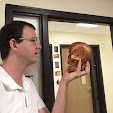*Main claim(s) or research questions
-One of Gorzelsky's main claims is that attending to the figurative language used by ethnographic participants and researchers in the field as well as by researchers during the composing of an ethnographic text can aid the critical goal of just social change without promoting an agenda that overrides the goals and claims of research participants.
*Major assumptions about methods and methodologies.
-Ethnographic writing can be artistic (in the sense of inviting those who compose and read into experiences of greater wholeness and into revisions of their previous notions regarding research participants), drawing on metaphor both for constructing the research narrative and for conducting the analysis.
-Gorzelsky's methods for composing a rhetorical ethnography are described in a three step process: 1) identify the “embodied metaphors enacted by people in the field,” 2) examine the “language-based metaphors used in the field,” and 3) be aware of what figures arise in the process of writing the ethnographic account (88).
-Conducting ethnography involves an awareness of the cognition involved in communication. It also entails, more broadly, an awareness of the workings of communicative acts on the individuals who produce and hear them and within the systems they are a part. This involves special attention to metaphor.
-Identifying the metaphors at work in the field provides a glimpse into the workings of the social and thought systems of which those who deploy them are a part. Becoming aware of the metaphors used by researchers and participants enables researchers to revise the metaphors they use as researchers in order to change relational patterns with claims and metaphors of their participants, a personal change that can participate in social change.
*Key words/phrases/concepts
-metaphorics/figurative language--these are used interchangeably except when explicitly speaking about simile near the end of the chapter.
-gestalt
-relational patterns
-systemic
-conversion/change
*Key texts.
-Bateson, Gregory. Steps to an Ecology of Mind. Chicago: U of Chicago P, 2000.
-Perls, Frederick, Ralph E. Hefferline, and Paul Goodman. Gestalt Therapy: Excitement and Growth in the Human Personality. New York: Dell, 1951.
*Major questions/challenges the text posed for me
-Gorzelsky's central claim about the political work performed by critical ethnography seems to be that it allows for the researcher to work on herself, on her personal metaphors, on her engagements with research subjects. Yet, she was also a participant in the community she studied, a group working toward "progressive" social change around literacy education for socially marginalized youth and their families. And her reflective work around metaphors enabled her to understand her disconnects with other activists in this social justice project. Implicitly, this work Gorzelsky does on herself is not simply for the scholarship she produced, but it will inform her future work in similar situations. In other words, by understanding the clash of metaphorics she encountered and working to revise her own metaphors, she enables herself to be in the world with others differently the next time such disconnects occur--specifically, when they occur again in activist contexts.
-Gorzelsky also takes up one of the very points regarding spirituality we took up in class last Thursday regarding an implicit or explicit teleology toward which its movements are or can be directed. In fact, this was the organizing tension of metaphorics (the invocation by another Struggle organizer of the progressive and “good” end toward which the Christian path is directed and Gorzelsky’s subscription to a set of [post-]Marxist redemptive and revolutionary metaphorics) she found herself responding to in the last part of her article. If, then, a telos of progressive good is a part of the organizing energia, or vivid story, that shapes and propels individuals and communities toward just action in the very specific instances and predicaments in which they and others find themselves, how can we as ethnographers account for that ground of reality, that play of metaphorics? Also, there seems something very rhetorical to me in the attention to symbols paid by the other Struggle organizer. His interest arose from a desire to communicate what he saw as an eternal truth to a particular audience experiencing very specific social and materials realities, necessitating a shaping of that message specific to that audience.
-It also seems implicit in Gorzelsky’s account that academics/researchers will more often, if not always, be the ones within an ethnographic project that have a tenuous or tortured relationship with religiosity (and not even the especially evangelical brands [Presbyterians are generally known as part of the American mainline rather than as part of the more evangelical traditions]. What does this say to those researchers who may well understand the dangers associated with power dynamics of sovereignty (Foucault’s beheaded king) and of a progressive telos (don’t worry about your working conditions today; everything we will be better in the sweet by and by), but who at the same time claim an identity that participates in both of those risky stances? In other words, I wonder about the usefulness of her positioning of researchers (which by necessity had to come out of her own experience and positionality) for ethnographers who subscribe to the notion of a sovereign God and who believe in Her/His ability to intervene in material and discursive reality.

1 comment:
I was interested in the point you raise about Gorzelsky's central claim that " the political work performed by critical ethnography seems to be that it allows for the researcher to work on herself, on her personal metaphors, on her engagements with research subjects." (your words above). When I read this, I went back to Horner to assess his critique of the focus on "self-reflexivity." One of his concerns is that this might displace focus on subjects/participants and place the researcher front-and-center. The question is "who benefits." Who benefited from Gorzelsky's research? One aspect about Gorzelsky's research I really liked was her admission that her relational habits were just not working and she needed to change them (92)--the metaphors she was using. i found this refreshing.
Post a Comment